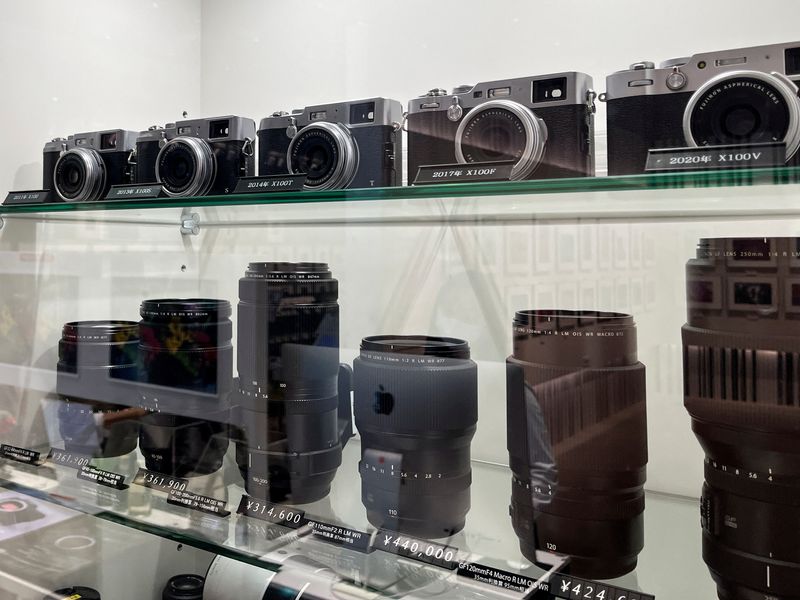By Rocky Swift
TOKYO (Reuters) - For years, Japan's Fujifilm pivoted away from its legacy camera business to focus on healthcare. But thanks in large part to the TikTok crowd, its retro-themed X100 digital cameras are now a roaring success, boosting its bottom line.
Fujifilm is struggling to meet demand for the $1,599 camera, prized by young 20-something social media fans for its looks and high-end functions.
The X100V model was so popular that in the fiscal year ended in March, it was the imaging division, which includes cameras, that was the biggest contributor to the company's record-high profit - the unit accounted for 37% of operating profit in fiscal 2023, versus 27% the year before.
After it sold out last year, the company increased production in China to double the launch volume for the VI that debuted in March, said Yujiro Igarashi, manager of Fujifilm's professional imaging group. He declined to give details about the production increase, or unit sales.
"We found that the orders far exceeded our forecast," Igarashi said. "In that sense, I was surprised that although we doubled our preparations, it still came up short."
Founded 90 years ago, Fujifilm competed against film industry leader Kodak for decades before finally overtaking it in sales in 2001. But the triumph proved short-lived, as the film industry soon collapsed and digital cameras became a standard feature in mobile phones.
To survive, Fujifilm tapped its expertise in film chemicals to shift into healthcare applications, a strategy also adopted by domestic competitors Canon and Olympus. Fujifilm didn't give up on its cameras, but it cut 5,000 jobs in its film division and moved most production to China the following year.
During the COVID years, Fujifilm doubled down on antiviral pills and vaccine operations, but now the cameras have put it back into the spotlight.
The company projects imaging sales growth to slow to 2.2% in fiscal 2024 from 14.5%, while operating profits in the segment are expected to dip 1.9%, estimates analysts say are conservative at best.
"We see downside risk to guidance for healthcare and business innovation, but major upside for imaging," wrote Jefferies analyst Masahiro Nakanomyo in June 6 report.
SAY CHEESE
The X100 was born in 2011 in an attempt to rescue Fujifilm's professional grade camera division, but its appeal is rooted in nostalgia, camera enthusiasts say.
"The look of it was pretty revolutionary, which is ironic, because it's just mimicking a film camera," said Mark Condon, founder of the camera equipment site Shotkit.
A key concept in retro tech is "friction", where the user is joined with the product through physical touch and interaction, according to Tokyo-based culture writer W. David Marx.
"Smartphones make it so easy to take photos that photos have been devalued," said Marx, author of "Status and Culture".
"By having physical cameras again, and having to develop film etc., it adds back friction, which adds back a sense of value to casual photo taking."
As travel restarted after the pandemic, demand for cameras shot up, and influencers on Instagram, TikTok and other social media sites turned the X100 into a status symbol.
"It is important to have a good looking camera that inspires you to want to take it out and shoot with it," said Benjamin Lee, who goes by @itchban on TikTok where he has more than 600,000 followers. "The X100 series is basically a fashion accessory you wear, on top of being a great camera."
Availability remains a problem.
Second-hand X100s sell for multiples of their list price on auction sites and there are online message boards for fans waiting for orders.
Fujifilm chief executive Teiichi Goto hinted last month he was happy to keep supply tight, pointing to Germany's Leica brand cameras as a model for maintaining premium value.
"It would be quite unfortunate to manufacture too much and lower the price," Goto said at the company's year-end earnings presentation on May 9.
But the long waitlists and steep prices may drive customers to competitors, such as Canon's G7X and Ricoh's GR series, influencer Lee said. This week, Ricoh also announced the launch of its first film camera in about 20 years, the Pentax 17.

Imaging group manager Igarashi acknowledged that production volumes were a hurdle, but the design and complexity of the X100 make it hard to manufacture at scale.
"We're trying really hard to increase the number of people, the number of production lines, and so on, but it's not taking off as quickly as you would think," he said. (This story has been refiled to delete an extraneous word, in paragraph 1)
